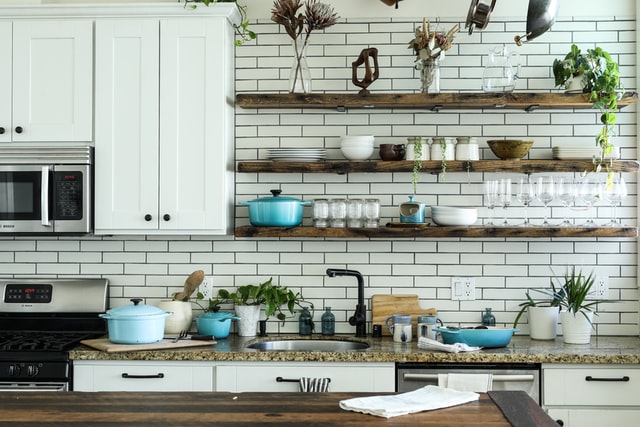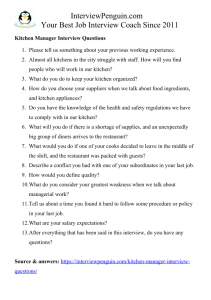Kitchens in busy restaurants often resemble a battlefield. Or a playground for children. There’s a mess everywhere, people run into each other, everyone is shouting, and the beautiful smells and flavors mix with smoke. You can feel the adrenaline in the air.
To maintain at least some order in a kitchen, and adherence to safety and hygienic rules and regulations, many restaurants hire a Kitchen Manager.
Typically not a cook (in fact often a healthy “opposition”, or control of the chef if you want), kitchen manager is responsible for overseeing the daily operations in the kitchen, from the perspective of staff and inventory. Let’s have a look at some questions you may face while interviewing for this interesting occupation.
Table of Contents
Please tell us something about your previous working experience
Experience is pivotal for this job. You do not necessarily need ten years of experience with running a kitchen, but you will need at least some managerial, supervisory, or kitchen experience. Try to explain how your past roles prepared you for this position. Explain how you hired new staff, assigned roles, led the training sessions, and monitored your stuff.
You should talk also about inventory, finding the best suppliers, arranging discounts, monitoring the level of stock, creating a system in your work. Basically they should get an impression that you did similar things before, know the ins and outs of the business, and will ease into the role.
Now, if you have no experience, but they still invited you for an interview, it means that it isn’t obligatory to have experience. Some prestigious restaurant chains have an excellent training program and working manual for their kitchen managers. If you apply for a job with one of them, it’s enough talking about any sort of experience.
You gained basic working habits, you are smart and motivated to learn, and ready to follow their manual, step by step.
Almost all kitchens in the city struggle with staff. How will you find people who will work in our kitchen?
This is indeed a tricky question, because they are right in their observations: restaurants struggle with staff. Unless you can offer some exceptional job conditions or benefits, which won’t be the case in most places, you will find it hard to recruit new cooks, dishwashers, and other staff members.
But you should not give up. Try to present some creative ways in the interviews. Perhaps you have a strong network of connections in the field. People know the quality of your management, and enjoy working under you–in a truly organized kitchen.
Or you will hunt for talent at schools, or try to advertise the job offers in some innovative ways. You can also say that you will do your best to build a strong team spirit in the kitchen. People should respect each other, and enjoy their time together.
This way you won’t recruit new staff members, but will ensure that the existing staff members won’t leave as soon as they get a slightly better offer from one of your competitors…
* May also interest you: Restaurant Manager interview questions.
What do you do to keep your kitchen organized?
The answer is simple: System. I’ve been to enough kitchens in my life. In a moment I walk in a kitchen, I immediately know whether they have a system in their work, or they don’t. Places that have a system are twice as effective and five times as clean as places that do not have a system…
Say that you will start with understanding the daily patterns, low hours, peak times, schedule on workdays and on weekends. You will also write down a list of duties for each staff member, and how the people complement each other in work.
You will try to create an effective system of processes for your kitchen, where instead of rushing into one another people help each another, and each one knows exactly what they are supposed to do at any time during the day. Learning the system will be an integral part of training of each new employee.
How do you choose your suppliers when we talk about food ingredients, and kitchen appliances?
You should do some research about your future place of work to come up with the best possible answer. Is it a luxury place? Do they focus on quality, or on price? Do they try to cook from local produce, or do they import most of their ingredients? What is their menu, and are there any ingredients that are difficult to get?
Answers to these questions should help you choose the right suppliers, or at least set the right criteria when choosing them. You can always add that you will try to build long term relationships with your suppliers (in order to get the best deals), and will try to negotiate the best possible conditions for your employer.
If you have any personal or professional experience with some companies and vendors from the city, or even some connections in this or that company, you can also mention it in your answer.
Do you have the knowledge of the health and safety regulations we have to comply with in our kitchen?
You can refer to your experience at this point. Say that the kitchen you led before (or worked in before) never received any penalty for violating the safety regulations. Inspectors came, but everything was in place, because you gave the safety and health the first priority.
You can also refer to latest changes and updates to regulations and rules, of course if you have the knowledge of them. And if this is your first job application in the field, you should ensure the managers that you understand the importance of safety and hygiene in the kitchen, and plan to learn all the regulations before starting the job (it may be the part of your training program).
* May also interest you: Kitchen Helper interview questions.
What will you do if there is a shortage of supplies, and an unexpectedly big group of diners arrives to the restaurant?
Say that you will try to solve the situation in an operative manner. Certainly you won’t send the diners away, or do any other action that could harm the profits of the restaurant.
Maybe you won’t get the best ingredients for the best price quickly, but you will get something. There are shops around in the area, you can always get some stuff, and in this case the price is not the most important factor. Basically you will try to get the supplies as quickly as possible, perhaps buying them yourself.
You can also add that you will instruct the kitchen staff to serve appetizers or starters, basically to keep the diners in a good mood and happy, until you quickly get the supplies to be able to serve them the main courses.
While doing your planning, you will count with this option, and will try to have a list of suppliers located nearby the restaurant, places where you can buy the emergency supplies in no time.
Other questions you may face in your kitchen manager job interview
- What would you do if one of your cooks decided to leave in the middle of the shift, and the restaurant was packed with guests?
- Describe a conflict you had with one of your subordinates in your last job.
- How would you define quality?
- What do you consider your greatest weakness when we talk about managerial work?
- Tell us about a time you found it hard to follow some procedure or policy in your last job.
- What are your salary expectations?
- After everything that has been said in this interview, do you have any questions?
* You can also download the entire list of questions in a one page long PDF, and practice your interview answers anytime later:
Conclusion, next steps
To manage a kitchen is no easy job, and the same can be said about an interview for this position. You may face several tricky situational questions, and will have to demonstrate both your experience, right attitude to work, and motivation, with your genuine and original interview answers.
Do a good research about your future place of work–their menu, reputation, strengths and weaknesses, their chef. Try to find something that resonates with you, something you can praise them for. This may help you to make a better connection with your interviewers. When you make a better connection, they will be more tolerant when it comes to your interview answers :).
May also help you succeed:
- Dishwasher interview questions.
- Chef interview questions – Will you be responsible also for cooking, or for designing the menu? Check the questions you may face in this case.
- Food service worker interview questions.


